Welcome to the February 2016 issue of the Global Washington newsletter.
IN THIS ISSUE
- Letter from our Executive Director
- Question of the Month
- Issue Brief: A Comprehensive Approach to Women’s Empowerment
- Featured Organization: Women’s Enterprises International
- Changemaker: Ndudi Chuku, Executive Director, Mission Africa
- Welcome New Members
- GlobalWA Member Events
- Career Center
- GlobalWA Events
Letter from our Executive Director
As we approach International Women’s Day on March 8, we turn our attention to the issue of women’s empowerment and its undeniable link to sustained development. Gender inequality in its many forms does not impact women alone, rather it affects families, communities and entire societies. The Sustainable Development Goals are only achievable if we empower women globally, something that will be top of mind next month at United Nations (UN) Headquarters in New York when the UN gathers representatives of Member States with NGOs from around the world for the sixtieth session of the Commission on the Status of Women.
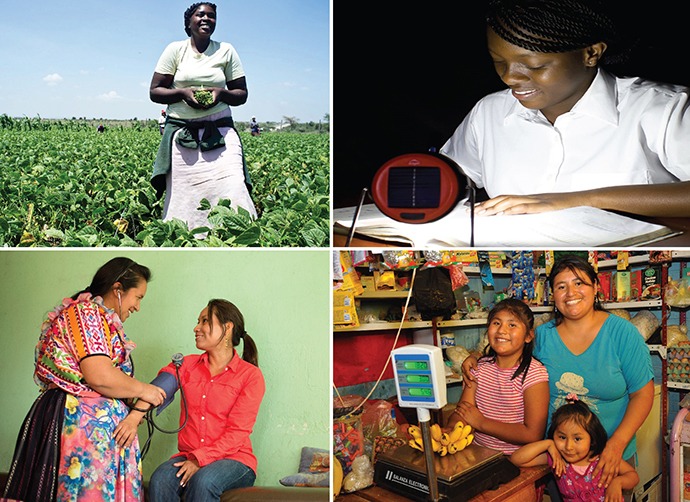
Photos: Global Partnerships
Many Global Washington members work tirelessly to improve women’s lives, and we’re highlighting a number of them in the articles below. I hope you will read on to learn about their current projects, success stories and plans for the future. These organizations are not only allowing women to realize their full potential, they are helping to create brighter futures for families everywhere.

Kristen Dailey
Executive Director
Question of the Month
![]() Does your organization have anything planned for International Women’s Day this year? If so, tell us who you are and what you have planned!
Does your organization have anything planned for International Women’s Day this year? If so, tell us who you are and what you have planned!
Issue Brief
A Comprehensive Approach to Women’s Empowerment
By Tara Cookson
“There is no tool more effective for development than the empowerment of women.” – Kofi Anan
This quote is often cited in development circles, but what does it actually take to achieve women’s empowerment? A clear definition of what empowerment looks like can help guide work that’s both high-impact and sustainable.
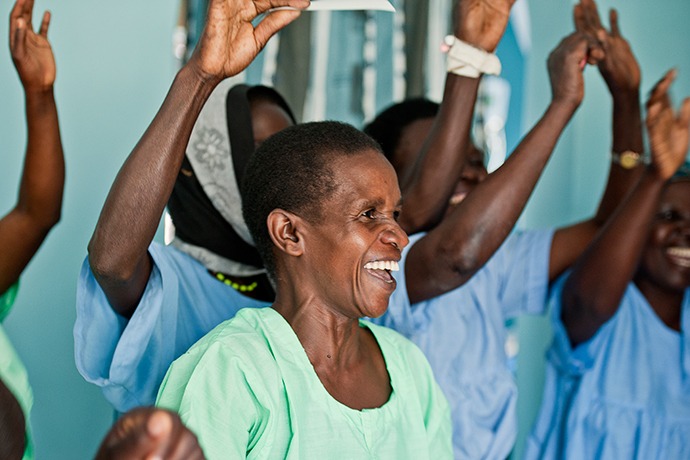
Photo: One By One
Defining Empowerment
Empowerment emerged as a fairly radical concept in development practice in the 1980s with the idea that there needed to be a transformation in the systems that assign women less power than men. Gender equity wouldn’t be achieved through women’s economic independence alone, many believed. Instead, there needed to be an overhaul of the political, economic, legal and social institutions and practices that drive inequality.
Take the case of Janina. Abandoned by her husband and now a single mother of four, Janina lives in the rugged Andean highlands. The nearest health clinic is three hours away by foot, and is often closed due to staff shortages. Janina is illiterate which makes it difficult to access public services, use the bank, and help her children with schoolwork. She lives with her children and brother, who is dependent upon her for care, on a small plot of arable land owned by her husband’s father. While her eldest children are in school, Janina secures her toddler to her back and tends to her crops, a task which in recent years has become more difficult due to persistent water shortages. If her father-in-law were to decide to sell the land, Janina’s future would be uncertain. While disempowerment takes many forms in Janina’s life, her case is far from unique.
Empowerment Today
Women’s empowerment and its link to sustainable development will be the guiding theme of the 60th session of the Commission on the Status of Women (CSW) taking place at the United Nations (UN) Headquarters in New York next month. The Sustainable Development Goals (SDGs) are only achievable if we make a “quantum leap” in women’s economic empowerment, according to UN Secretary General Ban Ki-moon. The CSW will host a first-of-its-kind high-level panel focusing specifically on women’s economic empowerment with the goal of providing thought leadership and mobilizing public and private actors to take concrete steps towards removing barriers to women’s economic participation.
The lasting impact of these meetings will largely depend on how empowerment is collectively defined, and how well stakeholders’ respective interventions are woven together as parts of a larger, transformative project.
Let’s return to the case of Janina. If economic empowerment is narrowly defined as simply earning an income, Janina cannot thrive. Cash alone won’t ensure that her health clinic will be open, that her children will receive a quality education, or that she’ll have access to clean water and electricity. Rather, Janina’s story portrays how diverse initiatives can play various roles in increasing women’s empowerment.
Future Directions for Empowerment
A transformative approach to women’s empowerment might look like a piece of cloth, with vertical interventions and horizontal, systems-level efforts woven tightly together. For example, access to safe and affordable family planning tools empower women and their partners to space births according to what they consider appropriate. Likewise, rural women gaining legal access to land provides food security and social status. Basic services like transportation allow women to access markets, and the availability of clean and affordable energy sources saves money and safeguards women’s health. Women’s ability to access financial services also depends on basic literacy – educating girls lays the foundation for future economic empowerment.
A number of Global Washington members work tirelessly to improve the lives of women, allowing them to look toward a brighter future for themselves and their families. Below are descriptions of just a few of these organizations, highlighting current projects. Learn more about these members and others on GlobalWA’s interactive map.
ACT for Congo: ACT for Congo empowers Congolese communities by providing critical support to local Congolese organizations that address the environment, education and health. They do not provide aid in the typical way. Instead, they facilitate. They connect their partners with resources and opportunities that would not be available to them if they did not have a U.S. partner advocating for them. ACT for Congo’s founding partner targets single teen and abandoned mothers in an integrated approach which includes disease prevention, vocational training, peer education and ongoing community support. www.actforcongo.org
Awamaki: Awamaki helps women’s associations in rural Peru start and run their own businesses selling artisan products. Volunteers teach product development, business and technical skills. They also help measure impact, collect stories and guide tourists to visit the artisan in their communities. Awamaki offers Peruvian women access to global markets and an improved quality of life in order to create sustainable development in their communities. www.awamaki.org
Bo M. Karlsson Foundation: Bo M. Karlsson Foundation (BMKF) empowers underprivileged women in Nepal through higher education. Since 2004, BMKF has awarded scholarships to 45 women students representing some of country’s most disadvantaged groups, including caste and ethnic minorities and women with disabilities. Several BMKF alumni rank among the first women in Nepal to work in their fields, including credit union manager Bhim Kumari ’14, electronics engineer Sarita Sharma ’14, medical doctor Sharada Chhetry ’13 and renewable energy expert Grishma Manandha ’11. www.bomkarlsson.com
Days for Girls International: Days for Girls International provides quality feminine hygiene products for girls by assembling and distributing feminine hygiene kits to areas in need. Girls around the world suffer indignities, infections and exploitation trying to stay in school without proper equipment for their menstrual needs. Days for Girls International works to ensure that every girl is safe and dignified with access to the proper information and supplies to stay healthy. www.daysforgirls.org
Global Partnerships: Global Partnerships (GP) is a nonprofit impact investor whose mission is to expand opportunity for people living in poverty. GP partners with organizations in Latin America, the Caribbean and Africa and helps them scale their work to reach millions of people living in poverty – the majority of whom are women. In the last 20 years, GP had helped 85 organizations deliver business loans to women entrepreneurs, essential medicines and health screenings to underserved women, solar lights to families living without electricity, and access to markets, technical assistance and financing to rural women farmers. www.globalpartnerships.org
Landesa: Landesa champions women’s land rights as a vital tool to address some of our world’s most persistent development challenges. Women with stronger rights to land experience increased participation in household decision making, which has a profound ripple effect on household nutrition, health, educational gains for children, and access to credit. Through innovative programs in Asia and Africa and the advocacy efforts of the Landesa Center for Women’s Land Rights, Landesa works to ensure that rural women have access to a transformative resource — secure rights to land. www.landesa.org
One By One: One By One partners with communities in Africa to provide life-transforming treatment for women and girls suffering with obstetric fistula, a devastating childbirth injury that causes uncontrollable leaking of urine and/or feces. Local teams carry out intensive rural outreach to educate about fistula and find women suffering in isolation. One By One covers the full cost of holistic treatment that restores a woman’s dignity and allows her to return to a productive life. One By One also works with communities to increase access to safe childbirth for all women. www.fightfistula.org
Planned Parenthood of the Great Northwest and the Hawaiian Islands (PPGNHI): Since 2001, PPGNHI’s Global Programs have improved the quality of sexual and reproductive health (SRH) services and education in Cameroon, the Dominican Republic (the DR), Ecuador, Laos, Nepal and Vietnam. Partneing with NGOs in the global south to positively impact the lives of women and families, PPGNHI currently focuses on improving youth SRH in the DR and Vietnam where the majority of clients are girls. Overall goals of PPGNHI’s global efforts include increasing access to family planning and other SRH services, empowering young people through education about SRH and rights, and reducing the incidence of unsafe abortion and its consequences. https://www.plannedparenthood.org/planned-parenthood-great-northwest-hawaiian-islands/international-programs
Spreeha Foundation: Spreeha strives to break the cycle of poverty for underprivileged people. Operating in the urban slums of Bangladesh, Spreeha focuses heavily on women’s health and empowerment. The young women leadership program caters to girls age 8 – 14, educating them about their rights and potential along with providing guidance and extracurricular skills training. The women empowerment and placement program provides professional and technical training to women age 15 – 45, and arranges for job placement once complete. Spreeha healthcare programs offer maternal care and family planning services, on top of wide-ranging medical support to its beneficiaries. www.spreeha.org
Thriive: Thriive provides pay-it-forward loans to ambitious entrepreneurs in developing countries (over half are women) to create jobs and strengthen vulnerable communities. Entrepreneurs repay this ThriiveCapital not in cash or profit, but by donating an equivalent value of staple products and job training to the poorest people in struggling communities. By paying their loans forward, Thriive entrepreneurs are inspiring new cultures of social responsibility and making vulnerable global communities more resilient and self-sufficient. Through providing women entrepreneurs with the affordable capital they need to expand their small businesses, Thriive helps lift more women out of poverty and builds shared prosperity worldwide. www.thriive.org
Featured Organization
Women’s Enterprises International
By Theresa Norris
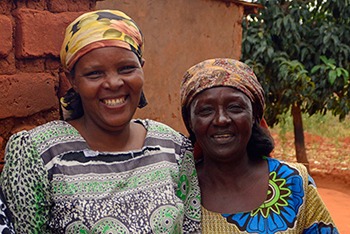 She went to bed alone, the night made even darker by her grief and fear. Grief from the death of her husband and fear from the uncertainty and hardship she faced as a widow with three small children. As she listened to the soft, steady breathing of her sleeping children, Julietah prayed to God to help her find a way to feed them for another day.
She went to bed alone, the night made even darker by her grief and fear. Grief from the death of her husband and fear from the uncertainty and hardship she faced as a widow with three small children. As she listened to the soft, steady breathing of her sleeping children, Julietah prayed to God to help her find a way to feed them for another day.
Julietah’s foremost concern, like mothers worldwide, was for her children. Mothers in rural Kenya and around the world come in a variety of forms; they are wives, mothers, widows, aunties, grandmothers, older sisters and caring women in the community. They are women who work and sacrifice for not only their own children, but also for others’ children. If you want to help children and families, help a mother.
Julietah is one of these mothers. She is a widow with 12 children now under her care. Shortly after her husband died, her brothers-in-law and their wives also died and all of their children came to live with her in the small mud/brick home that she shared with her three children. Julietah was consumed with worry for how she would provide for all the children. “I worry every day (about) what I’ll feed these children, and I worry that I don’t have water for them to drink or to use to wash so they can go to school,” she said. Then one day on her daily search for water, Julietah met Dorcas and things began to change.
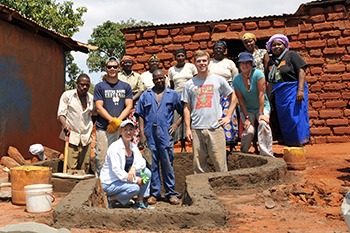 Dorcas was the leader of the newest women’s group started by Women’s Enterprises International (WEI) in Julietah’s home area of eastern Kenya. WEI empowers women to work together to improve the lives of their families and communities by facilitating the formation and training of women’s groups in rural Kenya. WEI provides grants that match the groups’ heard-earned savings to extend the impact of group projects in areas such as water, food security, solar power and education for orphans. WEI works to develop leaders and improve the quality of life for thousands in the region. And they know that when women work together, they can do amazing things.
Dorcas was the leader of the newest women’s group started by Women’s Enterprises International (WEI) in Julietah’s home area of eastern Kenya. WEI empowers women to work together to improve the lives of their families and communities by facilitating the formation and training of women’s groups in rural Kenya. WEI provides grants that match the groups’ heard-earned savings to extend the impact of group projects in areas such as water, food security, solar power and education for orphans. WEI works to develop leaders and improve the quality of life for thousands in the region. And they know that when women work together, they can do amazing things.
Dorcas, a widow herself, was moved by Julietah’s situation and invited her to join the WEI group of women who were working together to earn and save money to get clean water at each woman’s home. They, like Julietah, desperately needed water for drinking and cleaning. More importantly, they needed water to cook the dry maize and beans that are the staple food in the area.
Julietah joined the group and found herself surrounded by caring, supportive women who helped her carry her burden and learn new ways to earn income and save. When they could, the group also helped Julietah with school fees for her 12 children. After completing the first round of saving for their water project, the group had to decide who would receive the first 10,000-liter water tank. Continuing the WEI practice of distributing tanks to women with the greatest need, the group chose Julietah. They also selected her to receive one of the 15 concrete water tank bases that were constructed by a U.S. work team in August 2015.
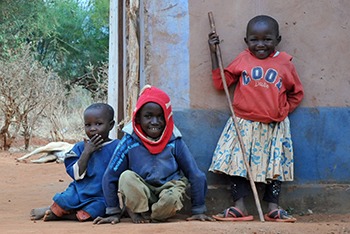 Julietah now has a giant 10,000-liter water tank installed in a solid concrete base and connected by a series of pipes and gutters to the roof of her home. After the first big rain, her tank was full of clean, fresh rain water that was harvested from her roof. Now that she has her own tank, her contributions to the group’s savings will be combined with funds from WEI in the U.S. to help other women in the group receive the blessing of clean water right outside their own front doors.
Julietah now has a giant 10,000-liter water tank installed in a solid concrete base and connected by a series of pipes and gutters to the roof of her home. After the first big rain, her tank was full of clean, fresh rain water that was harvested from her roof. Now that she has her own tank, her contributions to the group’s savings will be combined with funds from WEI in the U.S. to help other women in the group receive the blessing of clean water right outside their own front doors.
While Julietah’s responsibilities are still great, she no longer bears them alone. As a member of a WEI women’s group, she is working together with other mothers to improve the lives of their children and families. Julietah is the reason that WEI invests in women. By helping a mother, WEI empowers her to help everyone she touches.
Changemaker
Ndudi Chuku, Executive Director, Mission Africa
By Sara Atalla
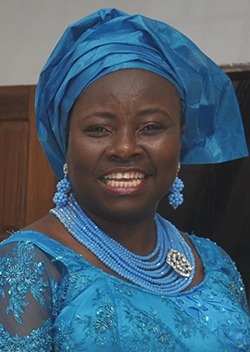 “Don’t forget us! Please, don’t forget us,” they pleaded as the car sped away en route to the airport. On that day in 1996, Ndudi Chuku was departing her Nigerian village for the United States — a mere 10 months after being married — leaving behind a husband, family and friends. Their pleas gave Chuku a feeling that she’ll never forget and that both haunts and inspires her to this day. “It motivates me daily as I continue to look for resources to help those I left behind.”
“Don’t forget us! Please, don’t forget us,” they pleaded as the car sped away en route to the airport. On that day in 1996, Ndudi Chuku was departing her Nigerian village for the United States — a mere 10 months after being married — leaving behind a husband, family and friends. Their pleas gave Chuku a feeling that she’ll never forget and that both haunts and inspires her to this day. “It motivates me daily as I continue to look for resources to help those I left behind.”
After seven years and 11 visa denials, Chuku’s husband George joined her in the U.S. Together they established Mission Africa in 2006 with a mandate to provide services that will have a positive, significant and lasting impact on the lives of the African people. The Auburn, Washington-based organization provides support in three core areas: education, health care and poverty alleviation. As Executive Director, Chuku uses the motivation that has stayed with her since first leaving home as she works in not only remote villages of Nigeria but also Tanzania, Uganda, Kenya, Rwanda, Sierra Leone, Ghana and Gambia. But Chuku’s dream of becoming a mobilizer and unifier began long before Mission Africa’s inception.
Though she witnessed extreme poverty, educational barriers, inhumane treatment and civil war growing up, Chuku describes her childhood and her close-knit family as happy. “We were certainly not rich. If we were poor, my parents made sure we didn’t notice,” she said. Her parents, who were well-respected in the community, worked hard to ensure their 11 children had access to a solid education. Her father, the only educated person in his family, started his career as a teacher and ended it after 33 years as an officer in the Nigerian Police Force. Her mother was a merchant who managed several roadside restaurants. Chuku credits her parents for her philanthropic heart, as she saw them help hundreds of people throughout their lifetimes.
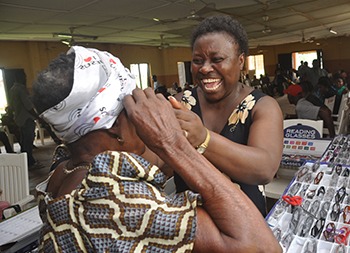 After establishing Mission Africa, Chuku served as a Program Assistant for the Bill & Melinda Gates Foundation, building strong relationships and support for the nonprofit she would eventually run full-time. “My time at the Gates Foundation fueled my passion and gave me the opportunity to make a tangible difference in millions of lives, simply by showing up at work every day,” said Chuku.
After establishing Mission Africa, Chuku served as a Program Assistant for the Bill & Melinda Gates Foundation, building strong relationships and support for the nonprofit she would eventually run full-time. “My time at the Gates Foundation fueled my passion and gave me the opportunity to make a tangible difference in millions of lives, simply by showing up at work every day,” said Chuku.
Making tangible differences in people’s lives didn’t end for Chuku when she left the Gates Foundation to focus her efforts on growing Mission Africa. Rather, it’s a theme that defines her life.
Ask Nwanne, a mother of four with no resources to sustain her roadside, second-hand clothing trade; she received a micro loan from Mission Africa last year and is now thriving with extra cash to care for her children and grandchildren. Ask Testimony, who lost both parents to HIV/AIDS and cancer and figured there was no hope of attending high school; she is thriving in school with the help of a Mission Africa scholarship. And there’s Joy, a Mission Africa scholarship graduate who grew up in a polygamous home where her mom was not the preferred wife — which means Joy was not a preferred child who would have the opportunity to attend school. A Mission Africa scholarship allowed Joy to graduate high school and attend college. Jean, another Mission Africa graduate, had few resources for her education after losing both parents at a young age. Jean is now in nursing school after successfully completing high school.
These four women are not alone. Chuku leads the Mission Africa team with a spirit that’s all-inclusive and contagious. Her proven devotion to what she calls “my African children” is exemplified in the organization’s numerous success stories.
Here are just a few accomplishments from Mission Africa’s current programs:
- Mission Africa’s academic scholarship program has allowed more than 300 students in rural villages in Nigeria, Tanzania, Kenya and Uganda to graduate high school and continue on to college or vocational training.
- Mission Africa has shipped 10 40-foot containers filled with books and school supplies to children and families in Nigeria, Kenya and Tanzania.
- Through Mission Africa’s medical clinics, 4,000 pairs of eyeglasses have been distributed to villagers in remote areas of eastern Nigeria. These and other free medical services have helped save and sustain thousands of lives and raise awareness about HIV/AIDS.
- Mission Africa acquired a piece of land in the Obosima village of Imo State, Nigeria, where the organization plans to build a hospital that will serve 350,000 people living in 18 villages.
Chuku has led efforts to build strategic partnerships with other nonprofits to better assist underprivileged families in Africa, specifically those living in small, rural villages. These partnership efforts have unified and empowered community leaders (chiefs) to increase their capacity and have strengthened their resolve to improve lives in the villages where Mission Africa offers programs and services. Detailed information on Mission Africa’s partner organizations can be found here.
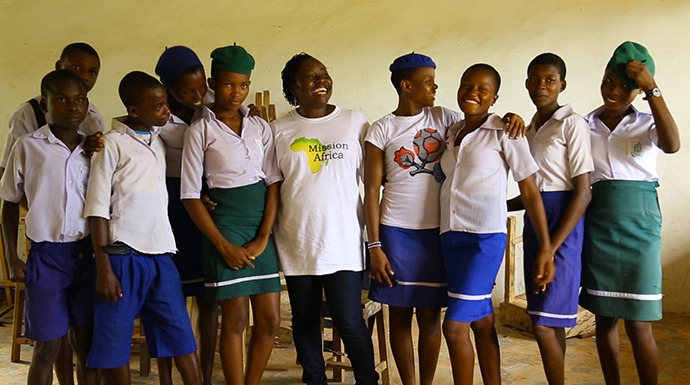 Chuku isn’t stopping anytime soon. She aims to build well-equipped hospitals and clinics that will provide continuity in health care for villagers, as well as schools and vocational training centers that will give village children equal educational opportunities. “The U.S. is a generous country, and I count it as a huge blessing that my family lives here in Washington state,” said Chuku. She attributes Mission Africa’s success to its generous donors and volunteers, and she has high hopes of growing the organization’s support in 2016.
Chuku isn’t stopping anytime soon. She aims to build well-equipped hospitals and clinics that will provide continuity in health care for villagers, as well as schools and vocational training centers that will give village children equal educational opportunities. “The U.S. is a generous country, and I count it as a huge blessing that my family lives here in Washington state,” said Chuku. She attributes Mission Africa’s success to its generous donors and volunteers, and she has high hopes of growing the organization’s support in 2016.
From her humble roots to inspirational leadership, carrying with her a passion for community service and a dedication to helping vulnerable communities and families worldwide, Chuku continues to chip away at the many obstacles she hopes to overcome. “Together, we are changing lives, one child at a time, one village at a time and one country at a time.”
Welcome New Members
Please welcome our newest Global Washington members. Take a moment to familiarize yourself with their work and consider opportunities for support and collaboration!
Tableau Foundation
The Tableau Foundation is made up of employees and partners of Tableau Software who care deeply about improving the world and believe data can unlock innovation and drive collaboration to help solve some of the world’s most pressing challenges. Their grants have spawned collaborations between Tableau employees, customers and partners as well as universities and other private and public institutions, and they have seen first-hand how data can drive the kind of innovation needed to move from alleviating the symptoms of the world’s problems to actually solving them. www.tableaufoundation.org
Member Events
Feb 17: World Affairs Council // YPIN Global Leader Dinner with Congressman Jim McDermott
Feb 18: Pangea Giving // Coffee + Chat
Feb 25: Shoreline Community College // Celebrating Food and Wellness around the World
Feb 27: NPH USA // Carnaval for a Cause Masquerade Party
Mar 18: Landesa // 10th Annual Seed the Change Luncheon
Career Center
Highlighted Positions
President/CEO – VillageReach
Executive Director – Snow Leopard Trust
Program Coordinator – FSG
For more jobs and resources, visit https://globalwa.org/resources/careers-in-development/
GlobalWA Events
February 25: Networking Happy Hour
March 1: Virtual Reality: Changing How We Engage in the World
March 22: Learn Tableau Software and Get Started With Your Own Data